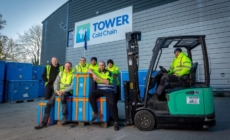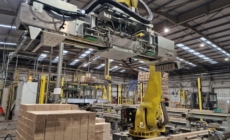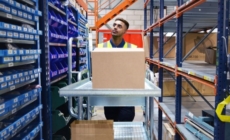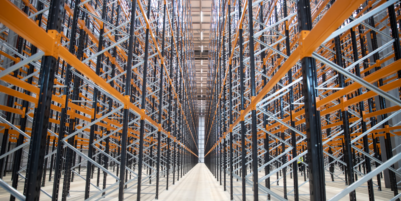-
Tower Launches Customer Sustainability Hub with Practical Tools for Lower-Impact Pharmaceutical Cold Chain - October 16, 2024
-
Six decision-making models for best practice WMS digital transformation - October 16, 2024
-
“Transforming Logistics: Precision and Purpose” – BIFA takes centre stage - October 15, 2024
-
JAMES JONES & SONS LTD EXPANDS ITS PALLETS & PACKAGING DIVISION THROUGH THE ACQUISITION OF HG TIMBER LTD - October 10, 2024
-
HUGO BECK EXPANDS MACHINE RANGE FOR E-COMMERCE, MAIL ORDER AND LOGISTICS - October 10, 2024
-
Winning Irish Exporter of the Year, Combilifts CEO Martin McVicar talks about the journey into the Global Market - October 8, 2024
-
JAMES JONES & SONS’ AUSTRALIAN SUBSIDIARY, HYNE GROUP, EXPANDS TO WESTERN AUSTRALIA - October 3, 2024
-
QUECLINK LAUNCHES SOLAR-POWERED ASSET TRACKER FOR TRAILERS AND CONTAINERS - October 3, 2024
-
Southgate Global Calls for Greater Health and Safety in the Warehouse Back Care Awareness Week - October 3, 2024
-
Nulogy to Expand Capabilities with Strategic Acquisition of Mingo Smart Factory - October 3, 2024
Retail Express’ Ed Betts explores the ways digital transformation can lead retailers to new horizons and help them get the edge in a crowded, competitive market.
With the effects of inflation waning[1], 2024 offers retailers a chance to breathe. Retailers must now look forensically at their business processes to find efficiency and alignment to protect themselves against future financial crises. They must seek ways to build resilience and agility, while developing the tools to exploit opportunities quickly in a market liable to change at a moment’s notice.
Understanding and embracing retail digital transformation is the key. No matter how set in their ways a retailer might be, now is the time to commit to transforming the central functions of their business structure to support a new way of working with data at its core. Digital transformation is critical: siloed, fragmented businesses are highly unlikely to find the pace to keep up with the modern structures of those that have streamlined and unified their processes.
Applying digital transformation where it matters
Many might relate the notion of digital transformation to grandstand moves, such as a flashy new website. While this might form part of a digital transformation effort, the true worth of digital transformation is in supplying the detail that makes such actions possible. Rethinking, realigning, and redesigning the core functions of a business to improve data availability will enable a retailer to operate in the way it should.
Of course, many feel that if business processes work, there is no need to change. Look deeper, though: many departments are so mired in admin and inefficient workflows that they cannot perform their jobs properly. Digital transformation efforts might open opportunities to merge AI into retail, introduce algorithmic retailing, develop leaner systems and, ultimately, free up the time of key staff to focus on the things that really matter.
The importance of a single plan
The digital transformation of retail is creating more intelligent merchandising practices, to drive competitive advantage through improved end-to-end planning and execution. This means every department has access to the same data and works from a single plan.
This can vastly reduce the amount of duplication in workload. Within a digitally united business, the paperwork surrounding inter-department communication is virtually eliminated. If a core plan changes in response to the market, a digitally transformed business can respond from top to bottom, communicating clearly and providing every function with the information they require in an instant.
Better business information through central data
Business information is vital, but for many businesses it can be a source of frustration. If businesses are to be agile in their decision making, they need information at their fingertips, without lag and without a clumsy process standing between people and numbers.
Digital transformation offers more than just easy access to data, however. Much of the minutiae of running repeatable functions could be handed off to AI, for example, allowing algorithms working with a central data set to discover and refine insights which teams of humans would take weeks to find – or perhaps never find at all. Digital transformation also offers the opportunity to create more dynamic reports, and incorporate predictive data built through intelligent models which consider not only past performance but the market as a whole.
Revealing powerful promotional opportunities
The power of promotion, as retailers know, is a vital driver towards increased sales and customer engagement. But the most powerful promotions are built around a critical workflow path which puts visibility first. Every part of the puzzle must know its part in promotion planning, from suppliers to design agencies, from those planning the shelves to those establishing prices.
Media and marketing departments can no longer operate separately from buyers, logistics and store operations teams. Digital transformation presents an opportunity for the kind of unity that will revolutionise end-to-end merchandising and allows marketers to work safely without falling foul of price establishment rules or geographical variations.
A new horizon for employees
Digital transformation will mean process overhauls, significant change, and lead to many key employees relearning the way they work. But those same employees will, through ring-fenced AI initiatives, be freed from much of the day-to-day grind which today prevents them from reaching their full potential. And that business, backed by accessible data empowered by AI and algorithmic tools, will have a far stronger picture of the way it should be working – and gain a vital edge over its competitors.
Edward Betts, General Manager – Retail Lead Europe, Retail Express
Ed has worked in the retail industry for over 20 years and joined Retail Express in 2019 where he is General Manager for the UK and Ireland. Ed has extensive and specialty knowledge of retail category management, pricing and buying requirements having worked with several UK retailers, including 8 years at Asda where he developed and launched a standalone online wine service. Following this, he worked for Distell, a large international drinks manufacturer, where he managed strategic accounts across several major UK grocers including Morrisons, Asda and Marks & Spencer. Ed is also Retail Express’ Head Consultant helping clients make more effective use of the products and services as well as providing consultancy on the effective use of pricing and category management.

About Retail Express
Retail Express is a leading provider of merchandising solutions and services for retail, wholesale and consumer packaged goods (CPG) manufacturers. It uses its deep industry understanding and expertise to provide business solutions that meet the evolving needs of merchandising and category management departments delivering improved productivity and enhanced financial results. Through its AI-powered end-to-end Intelligent Merchandising™ solution, Retail Express addresses the complex problems of advertising, marketing, promotions and pricing in retail, providing one version of the truth across the organisation and departments. Retail Express operates out of Leeds, UK, across Europe, North America & Australia. www.retailexpress.com.
[1] https://www.theguardian.com/business/2023/dec/14/inflation-slow-improving-biden-us-europe-uk#































